Why wouldn't they?View attachment 31157
View attachment 31158
Ok. Assuming this flotilla makes it to international waters outside Gaza, & assuming it’s intercepted and ends up in an Israeli port, & assuming the boats aren’t confiscated and sold at auction and are just turned around and sent back to their respective homes, etc…
Would this flotilla even have enough supplies (including the aid they’re carrying for Gaza, etc…) to make it back to somewhere else to resupply, or would Israel have to resupply them (provisions and ecologically friendly diesel x 37 to 49 boats?) just to send them on their way?
Would the flotillas funding immediately dry up if intercepted once they’re no longer useful? I wonder what the estimated monetary value of these now 51 boats in this flotilla are?
Hamas attacks Israel
- Thread starter Serryah
- Start date
You are using an out of date browser. It may not display this or other websites correctly.
You should upgrade or use an alternative browser.
You should upgrade or use an alternative browser.
I’ve asked several questions and I’m not sure which one you’re non-answering with these three words above.Why wouldn't they?
Are you non-answering a question with a question referring to:
1) would they have enough supplies to get back to another port if this flotilla is turned around without Israel, having to resupply them and refuel them? In your opinion…
2) would their funding immediately dry up once they’re (the selfie boats passengers) no longer useful to the motivation behind whoever is ponying up for this latest sailing adventure? In your opinion…
3) your three word question doesn’t fit in the context of guessing at the monetary value of these 51 boats combined, so pretty sure that’s not it…?
{I would be asking why their next stop would be Malta (?) but that’s neither here or there, & I’m not a member of their steering committee}
Selfie Sticks? Maybe that’s why they demoted Greta away from the compass?Searching for the black bird?
Il Manifesto, which has a correspondent aboard one of the flotilla vessels, reported on Tuesday that Thunberg was seen dragging her suitcase along a Tunis dock to transfer from the Steering Committee flagship Family to another vessel, the Alma. How dare they?!
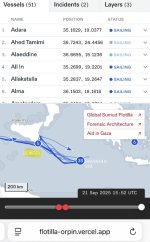
1I’ve asked several questions and I’m not sure which one you’re non-answering with these three words above.
Are you non-answering a question with a question referring to:
1) would they have enough supplies to get back to another port if this flotilla is turned around without Israel, having to resupply them and refuel them? In your opinion…
2) would their funding immediately dry up once they’re (the selfie boats passengers) no longer useful to the motivation behind whoever is ponying up for this latest sailing adventure? In your opinion…
3) your three word question doesn’t fit in the context of guessing at the monetary value of these 51 boats combined, so pretty sure that’s not it…?
{I would be asking why their next stop would be Malta (?) but that’s neither here or there, & I’m not a member of their steering committee}
Selfie Sticks? Maybe that’s why they demoted Greta away from the compass?
View attachment 31159
Hey, this is kind of cool, from the flotilla’s own website, where you can play with the tabs, & add layers of information like wind direction, and sea depth and things like that.

Also, if you click on the tab for forensic architecture, this is the first thing that pops up:

I remember that one!! That’s were those guys in the cemetery were shooting rockets over top of the hospital towards Israel…I’m pretty sure it’s the one. Let me blow the dust off my Google.

 en.wikipedia.org
Yeah, that’s the one! On 17 October 2023, an explosion took place in a courtyard of al-Ahli Arab Hospital in Gaza City during the Gaza war, resulting in a large number of displaced Palestinians seeking shelter there being killed or injured.
en.wikipedia.org
Yeah, that’s the one! On 17 October 2023, an explosion took place in a courtyard of al-Ahli Arab Hospital in Gaza City during the Gaza war, resulting in a large number of displaced Palestinians seeking shelter there being killed or injured.
Israel, the United States, France, the United Kingdom, and Canada said that their intelligence sources indicated that the cause of the explosion was a failed rocket launchfrom within Gaza by the Palestinian Islamic Jihad (PIJ). Hamas and PIJ stated the explosion was caused by an Israeli airstrike, or space lasers, definitely one of those two.
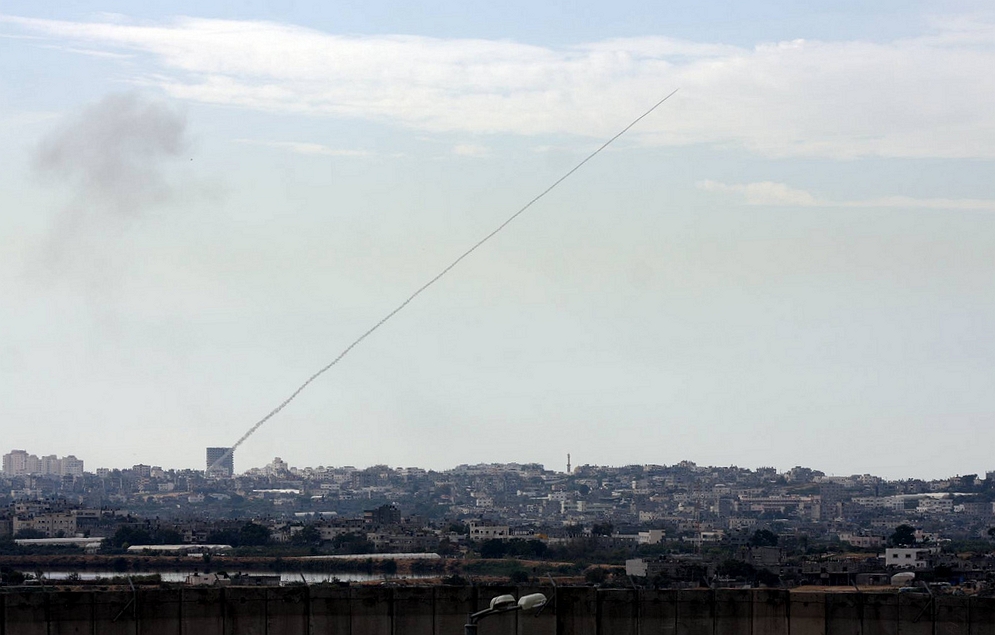
 en.wikipedia.org
In the days after the incident, several organizations concluded that an errant rocket from Gaza was the likeliest explanation, including the Associated Press, CNN, The Economist, The Guardian, and The Wall Street Journal. Le Monde and the New York Times rejected the Israeli interpretation of Al Jazeera and N12 footage cited as evidence of a stray rocket from Gaza hitting the hospital, while noting that other evidence was consistent with that hypothesis and concluding that the cause of the blast remained uncertain. In November 2023, Human Rights Watch said that the available evidence made an Israeli airstrike "highly unlikely".
en.wikipedia.org
In the days after the incident, several organizations concluded that an errant rocket from Gaza was the likeliest explanation, including the Associated Press, CNN, The Economist, The Guardian, and The Wall Street Journal. Le Monde and the New York Times rejected the Israeli interpretation of Al Jazeera and N12 footage cited as evidence of a stray rocket from Gaza hitting the hospital, while noting that other evidence was consistent with that hypothesis and concluding that the cause of the blast remained uncertain. In November 2023, Human Rights Watch said that the available evidence made an Israeli airstrike "highly unlikely".

 flotilla-orpin.vercel.app
flotilla-orpin.vercel.app
If this was really about aid, this flotilla would be using the largest boats available with the least amount of crew and passengers, but this seems to be something else entirely.

Also, if you click on the tab for forensic architecture, this is the first thing that pops up:

I remember that one!! That’s were those guys in the cemetery were shooting rockets over top of the hospital towards Israel…I’m pretty sure it’s the one. Let me blow the dust off my Google.

Al-Ahli Arab Hospital explosion - Wikipedia
Israel, the United States, France, the United Kingdom, and Canada said that their intelligence sources indicated that the cause of the explosion was a failed rocket launchfrom within Gaza by the Palestinian Islamic Jihad (PIJ). Hamas and PIJ stated the explosion was caused by an Israeli airstrike, or space lasers, definitely one of those two.

Palestinian rocket attacks on Israel - Wikipedia

Global Sumud Flotilla Tracker
FA and members of the Investigative Commons have been monitoring the status of the Global Sumud Flotilla as it embarked on a journey to deliver aid to Gaza under the ongoing genocide and total blockade.
Ah, ok. I asked because this was about optics, with “representative” or “symbolic” aid as a gesture as opposed to actual substantial aid that would come in a fleet of cargo carrying (as opposed to sailboats) vessels.Are you non-answering a question with a question referring to:
1) would they have enough supplies to get back to another port if this flotilla is turned around without Israel, having to resupply them and refuel them? In your opinion…
If this was really about aid, this flotilla would be using the largest boats available with the least amount of crew and passengers, but this seems to be something else entirely.
500 to 800 tonnes.Ah, ok. I asked because this was about optics, with “representative” or “symbolic” aid as a gesture as opposed to actual substantial aid that would come in a fleet of cargo carrying (as opposed to sailboats) vessels.
If this was really about aid, this flotilla would be using the largest boats available with the least amount of crew and passengers, but this seems to be something else entirely.
The combined carrying capacity of all 51 boats? Freeland’s arse? Random numbers? What this flotilla “could” be carrying if it consisted of cargo vessels as opposed to sail boats with diesel assist? Gotta link and an explanation of what you’re saying here? Sure you don’t mean another 500-700 mouths to feed in this500 to 800 tonnes.
500 - 800 tonnes of aid.The combined carrying capacity of all 51 boats? Freeland’s arse? Random numbers? What this flotilla “could” be carrying if it consisted of cargo vessels as opposed to sail boats with diesel assist? Gotta link and an explanation of what you’re saying here? Sure you don’t mean another 500-700 mouths to feed in thisconvoyflotilla?
500 - 800 tonnes of aid.
??? Just to see where these numbers come from???Gotta link
Yes, there is significant potential for dock and port workers—particularly in Italy—to refuse or block freight shipments to Israel in the event of an attack on or interference with the Global Sumud Flotilla. This stems from explicit solidarity pledges by unions and workers in key Mediterranean ports, building on a history of labor actions against Israeli shipping amid the Gaza crisis.
Here's a breakdown based on recent developments:
Key Players and Statements
Genoa Dockworkers (Italy): The primary hotspot. On September 1, 2025, workers at the Port of Genoa—Europe's fourth-busiest container port, handling ~2.5 million TEUs annually—issued a direct ultimatum: If Israel blocks, attacks, or impedes the flotilla (which departed from Barcelona and other points en route to Gaza), they will halt all cargo to Israel, potentially shutting down Mediterranean trade routes. Union leaders stated, "If we lose contact with our comrades, we will shut it all down. Not a single nail will leave for Israel," targeting ~14,000 containers yearly bound for Israeli ports like Ashdod and Haifa. They've already blocked explosive shipments to Israel in early September as a precursor action.
Broader Italian Port Network: Solidarity extends to ports in Trieste, Livorno, and Naples via the Italian Dockworkers' Union (USB). On September 2, they rallied with flotilla activists, vowing a "total blockade" of Israeli freight if the aid convoy faces violence, echoing 2010 Mavi Marmara responses. This could cascade to disrupt 20–30% of EU-Israel trade volume, per logistics estimates.
Historical and Current Context
Precedents: Italian workers have form— in May 2024, Genoa blocked a Zim Lines ship (Israeli-owned) for 20 days over Gaza strikes. Globally, U.S. ILWU dockworkers (West Coast) passed a 2024 resolution refusing military cargo to Israel, and Belgian ports like Zeebrugge joined boycotts in 2023–2024. If the flotilla is hit (e.g., by reported drone threats or naval interception), these could amplify into coordinated actions via the International Dockworkers Council.
Triggers and Scale: An attack on the flotilla—now in its "yellow zone" approach to Gaza with 40+ vessels—would likely activate these pledges immediately, as organizers have pre-coordinated with unions for rapid response. X discussions highlight grassroots support, with calls for escalation if interference occurs. However, legal hurdles (e.g., EU trade laws) could limit duration, though past blockades have lasted weeks.
Likelihood and Impact
High likelihood in Italy due to the explicit, publicized threats tied directly to the flotilla's fate. Broader spread (e.g., to France's Marseille or Greece) depends on escalation but is plausible given rising pro-Palestine labor sentiment. Economically, it could delay $1–2 billion in annual EU-Israel freight, pressuring Tel Aviv via supply chain disruptions.
This potential underscores the flotilla's role in galvanizing international labor solidarity, though outcomes hinge on real-time events as of September 21, 2025.
Here's a breakdown based on recent developments:
Key Players and Statements
Genoa Dockworkers (Italy): The primary hotspot. On September 1, 2025, workers at the Port of Genoa—Europe's fourth-busiest container port, handling ~2.5 million TEUs annually—issued a direct ultimatum: If Israel blocks, attacks, or impedes the flotilla (which departed from Barcelona and other points en route to Gaza), they will halt all cargo to Israel, potentially shutting down Mediterranean trade routes. Union leaders stated, "If we lose contact with our comrades, we will shut it all down. Not a single nail will leave for Israel," targeting ~14,000 containers yearly bound for Israeli ports like Ashdod and Haifa. They've already blocked explosive shipments to Israel in early September as a precursor action.
Broader Italian Port Network: Solidarity extends to ports in Trieste, Livorno, and Naples via the Italian Dockworkers' Union (USB). On September 2, they rallied with flotilla activists, vowing a "total blockade" of Israeli freight if the aid convoy faces violence, echoing 2010 Mavi Marmara responses. This could cascade to disrupt 20–30% of EU-Israel trade volume, per logistics estimates.
Historical and Current Context
Precedents: Italian workers have form— in May 2024, Genoa blocked a Zim Lines ship (Israeli-owned) for 20 days over Gaza strikes. Globally, U.S. ILWU dockworkers (West Coast) passed a 2024 resolution refusing military cargo to Israel, and Belgian ports like Zeebrugge joined boycotts in 2023–2024. If the flotilla is hit (e.g., by reported drone threats or naval interception), these could amplify into coordinated actions via the International Dockworkers Council.
Triggers and Scale: An attack on the flotilla—now in its "yellow zone" approach to Gaza with 40+ vessels—would likely activate these pledges immediately, as organizers have pre-coordinated with unions for rapid response. X discussions highlight grassroots support, with calls for escalation if interference occurs. However, legal hurdles (e.g., EU trade laws) could limit duration, though past blockades have lasted weeks.
Likelihood and Impact
High likelihood in Italy due to the explicit, publicized threats tied directly to the flotilla's fate. Broader spread (e.g., to France's Marseille or Greece) depends on escalation but is plausible given rising pro-Palestine labor sentiment. Economically, it could delay $1–2 billion in annual EU-Israel freight, pressuring Tel Aviv via supply chain disruptions.
This potential underscores the flotilla's role in galvanizing international labor solidarity, though outcomes hinge on real-time events as of September 21, 2025.
Gotta link
?????? Just to see where these numbers come from???
This whole thing, is doesn’t meantion:Yes, there is significant potential for dock and port workers—particularly in Italy—to refuse or block freight shipments to Israel in the event of an attack on or interference with the Global Sumud Flotilla. This stems from explicit solidarity pledges by unions and workers in key Mediterranean ports, building on a history of labor actions against Israeli shipping amid the Gaza crisis.
Here's a breakdown based on recent developments:
Key Players and Statements
Genoa Dockworkers (Italy): The primary hotspot. On September 1, 2025, workers at the Port of Genoa—Europe's fourth-busiest container port, handling ~2.5 million TEUs annually—issued a direct ultimatum: If Israel blocks, attacks, or impedes the flotilla (which departed from Barcelona and other points en route to Gaza), they will halt all cargo to Israel, potentially shutting down Mediterranean trade routes. Union leaders stated, "If we lose contact with our comrades, we will shut it all down. Not a single nail will leave for Israel," targeting ~14,000 containers yearly bound for Israeli ports like Ashdod and Haifa. They've already blocked explosive shipments to Israel in early September as a precursor action.
Broader Italian Port Network: Solidarity extends to ports in Trieste, Livorno, and Naples via the Italian Dockworkers' Union (USB). On September 2, they rallied with flotilla activists, vowing a "total blockade" of Israeli freight if the aid convoy faces violence, echoing 2010 Mavi Marmara responses. This could cascade to disrupt 20–30% of EU-Israel trade volume, per logistics estimates.
Historical and Current Context
Precedents: Italian workers have form— in May 2024, Genoa blocked a Zim Lines ship (Israeli-owned) for 20 days over Gaza strikes. Globally, U.S. ILWU dockworkers (West Coast) passed a 2024 resolution refusing military cargo to Israel, and Belgian ports like Zeebrugge joined boycotts in 2023–2024. If the flotilla is hit (e.g., by reported drone threats or naval interception), these could amplify into coordinated actions via the International Dockworkers Council.
Triggers and Scale: An attack on the flotilla—now in its "yellow zone" approach to Gaza with 40+ vessels—would likely activate these pledges immediately, as organizers have pre-coordinated with unions for rapid response. X discussions highlight grassroots support, with calls for escalation if interference occurs. However, legal hurdles (e.g., EU trade laws) could limit duration, though past blockades have lasted weeks.
Likelihood and Impact
High likelihood in Italy due to the explicit, publicized threats tied directly to the flotilla's fate. Broader spread (e.g., to France's Marseille or Greece) depends on escalation but is plausible given rising pro-Palestine labor sentiment. Economically, it could delay $1–2 billion in annual EU-Israel freight, pressuring Tel Aviv via supply chain disruptions.
This potential underscores the flotilla's role in galvanizing international labor solidarity, though outcomes hinge on real-time events as of September 21, 2025.
500 - 800 tonnes of aid.
Egypt-Turkey Joint Naval Exercises and the Global Sumud Flotilla
On September 18, 2025, Turkey and Egypt announced their first joint naval and air exercises in 13 years, named Friendship Sea (or Bahr El Sadaka in Arabic, meaning "Sea of Friendship"). Scheduled for September 22–26, 2025, in the Eastern Mediterranean, these drills coincide precisely with the anticipated approach of the Global Sumud Flotilla toward Gaza's waters. While official statements emphasize bilateral cooperation and interoperability, the timing has sparked widespread speculation—and hope among activists—that the exercises serve as a protective buffer against potential Israeli interference with the flotilla.
Here's a detailed overview:
Exercise Details
Participants:
Turkish Forces: Frigates TCG Oruçreis and TCG Gediz; fast patrol boats TCG İmbat and TCG Bora; submarine TCG Gür; two F-16 fighter jets.
Egyptian Forces: Undisclosed naval units, with commanders from both nations attending a "Distinguished Visitors Day" on September 25.
Objectives: Enhancing naval coordination, search-and-rescue operations, and regional stability, per the Turkish Defense Ministry. This marks a thaw in historically tense Turkey-Egypt relations, strained since the 2013 Egyptian coup but improving via recent diplomatic talks.
Location: Eastern Mediterranean, near key maritime routes but in international waters—overlapping the flotilla's projected path from Malta toward Gaza.
The drills are the largest of their kind in the region recently, building on a May 2024 memorandum for defense industry cooperation and signaling a potential Egypt-Turkey axis amid broader MENA realignments (e.g., Saudi-Pakistan pacts).
Connection to the Global Sumud Flotilla
The Global Sumud Flotilla—comprising 40+ vessels carrying 500–800 tons of aid from over 40 countries—departed ports in Spain, Italy, Tunisia, and Greece in early September 2025. As of September 21, it's in the "yellow zone" (approaching Gaza within 100 nautical miles), facing reported Israeli drone surveillance and naval threats. Organizers have pre-coordinated with regional allies, and the exercises' overlap is no coincidence:
Protective Role?: Activists and observers on X (formerly Twitter) widely interpret the drills as a deterrent. If the flotilla issues an SOS in international waters, Turkish and Egyptian vessels could respond under maritime law, framing any Israeli action as aggression against allied forces. One post notes: "If the flotilla is threatened by Israel... both Egypt and Turkey will come to their aid for protection."26aa37 Another highlights: "Joint Exercise... right as the Gaza Aid Flotilla will be arriving."a70d69
Strategic Signaling: Egypt, which enforces the Gaza blockade at Rafah, and Turkey, a vocal flotilla supporter under President Erdoğan, appear to be projecting unified resolve. This echoes 2010's Mavi Marmara incident (a Turkish-led flotilla attacked by Israel) and recent Italian port blockades. X users call it a "defense armada," with one stating: "Any ‘other’ military activity caught during the exercise will be monitored and dealt with."f0264a
Risks and Uncertainties: Israel has labeled the flotilla a "Hamas-linked" threat and deployed surveillance assets. While the exercises boost deterrence, Egypt's blockade role adds irony—some flotilla segments originated near Egyptian ports but rerouted due to delays. No official link has been confirmed by Ankara or Cairo, but the optics pressure Tel Aviv amid global scrutiny.
Broader Implications
This convergence amplifies the flotilla's challenge to Israel's Gaza siege, potentially galvanizing labor actions (e.g., Italian dockworker blockades) and diplomatic fallout. If unhindered, Sumud could deliver aid directly, symbolizing "steadfastness" (sumud in Arabic). As one analyst put it: "The protection of activists by Turkey and Egypt... is a welcome development."e19bbf All eyes remain on the Mediterranean as of September 21, 2025—updates could shift rapidly.
On September 18, 2025, Turkey and Egypt announced their first joint naval and air exercises in 13 years, named Friendship Sea (or Bahr El Sadaka in Arabic, meaning "Sea of Friendship"). Scheduled for September 22–26, 2025, in the Eastern Mediterranean, these drills coincide precisely with the anticipated approach of the Global Sumud Flotilla toward Gaza's waters. While official statements emphasize bilateral cooperation and interoperability, the timing has sparked widespread speculation—and hope among activists—that the exercises serve as a protective buffer against potential Israeli interference with the flotilla.
Here's a detailed overview:
Exercise Details
Participants:
Turkish Forces: Frigates TCG Oruçreis and TCG Gediz; fast patrol boats TCG İmbat and TCG Bora; submarine TCG Gür; two F-16 fighter jets.
Egyptian Forces: Undisclosed naval units, with commanders from both nations attending a "Distinguished Visitors Day" on September 25.
Objectives: Enhancing naval coordination, search-and-rescue operations, and regional stability, per the Turkish Defense Ministry. This marks a thaw in historically tense Turkey-Egypt relations, strained since the 2013 Egyptian coup but improving via recent diplomatic talks.
Location: Eastern Mediterranean, near key maritime routes but in international waters—overlapping the flotilla's projected path from Malta toward Gaza.
The drills are the largest of their kind in the region recently, building on a May 2024 memorandum for defense industry cooperation and signaling a potential Egypt-Turkey axis amid broader MENA realignments (e.g., Saudi-Pakistan pacts).
Connection to the Global Sumud Flotilla
The Global Sumud Flotilla—comprising 40+ vessels carrying 500–800 tons of aid from over 40 countries—departed ports in Spain, Italy, Tunisia, and Greece in early September 2025. As of September 21, it's in the "yellow zone" (approaching Gaza within 100 nautical miles), facing reported Israeli drone surveillance and naval threats. Organizers have pre-coordinated with regional allies, and the exercises' overlap is no coincidence:
Protective Role?: Activists and observers on X (formerly Twitter) widely interpret the drills as a deterrent. If the flotilla issues an SOS in international waters, Turkish and Egyptian vessels could respond under maritime law, framing any Israeli action as aggression against allied forces. One post notes: "If the flotilla is threatened by Israel... both Egypt and Turkey will come to their aid for protection."26aa37 Another highlights: "Joint Exercise... right as the Gaza Aid Flotilla will be arriving."a70d69
Strategic Signaling: Egypt, which enforces the Gaza blockade at Rafah, and Turkey, a vocal flotilla supporter under President Erdoğan, appear to be projecting unified resolve. This echoes 2010's Mavi Marmara incident (a Turkish-led flotilla attacked by Israel) and recent Italian port blockades. X users call it a "defense armada," with one stating: "Any ‘other’ military activity caught during the exercise will be monitored and dealt with."f0264a
Risks and Uncertainties: Israel has labeled the flotilla a "Hamas-linked" threat and deployed surveillance assets. While the exercises boost deterrence, Egypt's blockade role adds irony—some flotilla segments originated near Egyptian ports but rerouted due to delays. No official link has been confirmed by Ankara or Cairo, but the optics pressure Tel Aviv amid global scrutiny.
Broader Implications
This convergence amplifies the flotilla's challenge to Israel's Gaza siege, potentially galvanizing labor actions (e.g., Italian dockworker blockades) and diplomatic fallout. If unhindered, Sumud could deliver aid directly, symbolizing "steadfastness" (sumud in Arabic). As one analyst put it: "The protection of activists by Turkey and Egypt... is a welcome development."e19bbf All eyes remain on the Mediterranean as of September 21, 2025—updates could shift rapidly.
Use AI yourself or read the above. What made you think I was replying to you rather than just posting floatilla support network and outcome of stopping said floatilla?This whole thing, is doesn’t meantion:
Last edited:
Use AI yourself or read the above. What made you think I replying to you rather than just posting floatilla support network and outcome of stopping said floatilla?
I have done my own search, and thus my question. Generally, if posting something, you would be able to verify it or you would state that it’s your opinion, right?The Global Sumud Flotilla—comprising 40+ vessels carrying 500–800 tons of aid

This is the biggest boat carrying the most aid, and this comes from:

Global Sumud Flotilla stocked with aid for Gaza arrival
The Global Sumud Flotilla continues to sail toward Gaza despite being struck twice by Israel's military. Each boat in the convoy is stocked with humanitarian...

Assumably minus what the 500-700 passengers are consuming?

Let me try to verify with AI also.
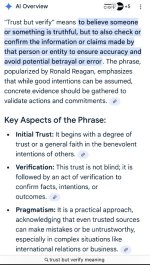
It’s a screenshot so you can see I haven’t altered anything in the AI’s answer & shows the question asked of the AI at the bottom. I trust you believe your answer but asked for verification, & part of that is knowing what was fed to the AI in order to come up with the numbers you site.

I managed, even with my antiquated search engine and such, to show both the question to and answer from an AI in such a way that it can be verified. Trippy, eh?
Now I don’t have any experience with naval sea going cargo, but I do have some experience in logistics with moving things, so I’m equating the largest boat in that
This would be hard pressed to contain the volume of a 53’ trailer (& it’s the vessel carrying the most aid):Assuming over the last three weeks this flotilla’s consumers would need 70-100 tonnes of food or so, and these are fishing boats and small ferry’s and sail boats and yachts, as opposed to cargo carriers…

Looking at all the windows, I’m assuming (I know, ass/u/me) that this isn’t primarily designed for cargo, but that those are living quarters. Subtract room for crew quarters, fuel tanks, engine, etc…& keep in mind that this thing still has to be able to float once it’s loaded, how many tonnes of aid (I know I’m switching from imperial to metric in my question here, but I think in terms of weight in imperial) would this biggest boat carrying the most aid carry?

Extrapolate down through the cartoonish…
 …boats that are probably larger than the average size in the fleet…flotilla, down to the sailboats that might be lucky to have four people on them, and then factor in the claim that there’s 500-700 passengers and that each one of them is consuming consumables and taking up space, etc…
…boats that are probably larger than the average size in the fleet…flotilla, down to the sailboats that might be lucky to have four people on them, and then factor in the claim that there’s 500-700 passengers and that each one of them is consuming consumables and taking up space, etc…
Does that leave the claim from your AI with whatever question you posted to it, plausible for there to be 500-800 tonnes (roughly 1,100,000 - 1,750,000 lbs) of aid arriving on these boats into the international Waters off of Gaza? Hell, the passengers themselves as far as cargo capacity goes are probably 85,000 to 125,000 lbs (assuming that the 500 to 700 passengers claim isn’t an exaggeration).

Thus my question. I don’t think the math will work for 500 - 800 tonnes (metric) of cargo capacity, but that’s just my opinion. I just don’t see this
Anywho, back to Palestine & not the propaganda circus ‘sailing’ towards it.

But it doesn't yet fit the requirement of a "defined territory".
With no agreement on final borders (and no actual peace process), it's difficult to know with any certainty what is meant by Palestine.
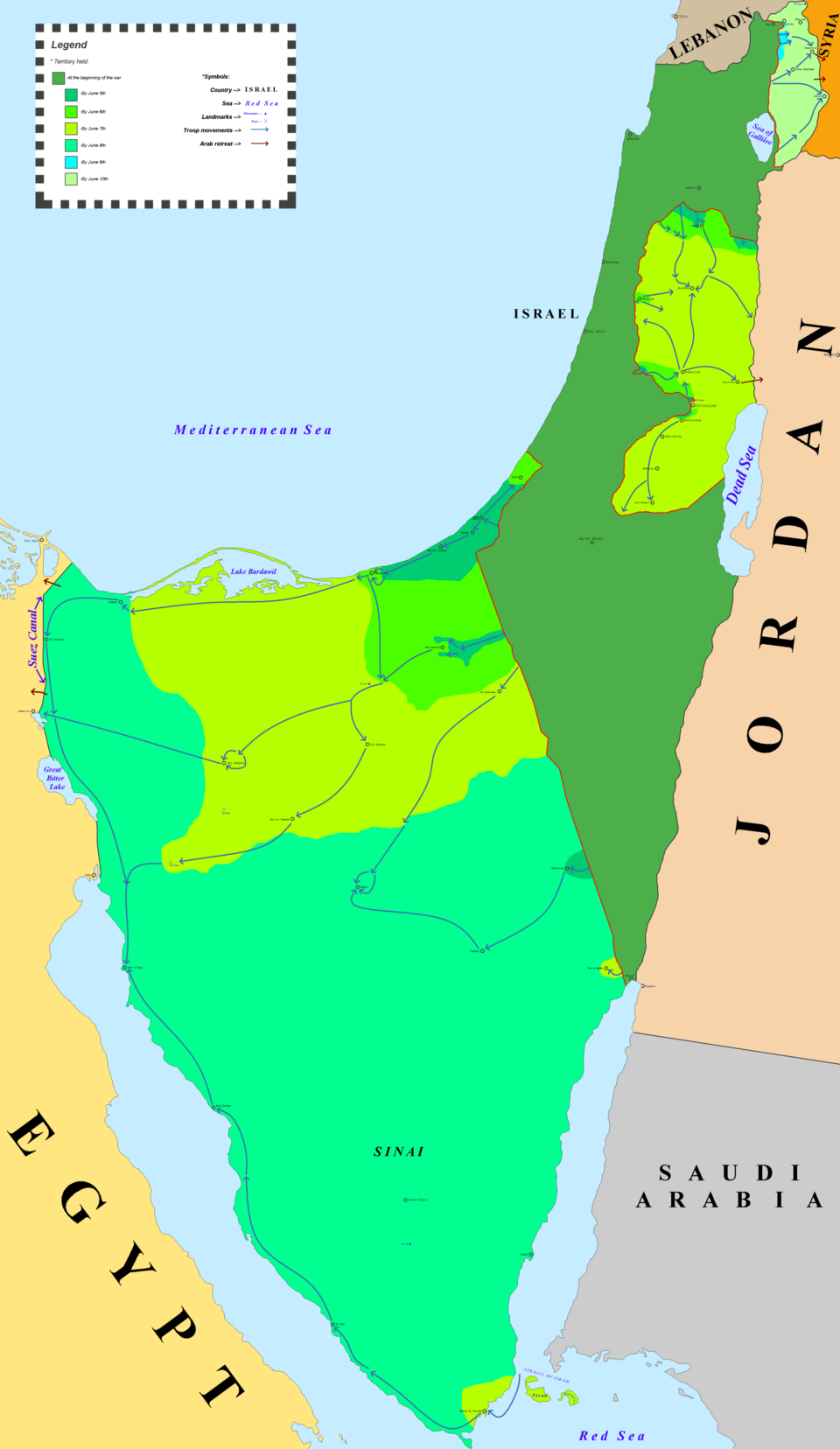
 en.wikipedia.org
Even a cursory glance at a map shows where the problems begin. The West Bank and Gaza Strip have been geographically separated by Israel for three quarters of a century, since Israel's independence in 1948.
en.wikipedia.org
Even a cursory glance at a map shows where the problems begin. The West Bank and Gaza Strip have been geographically separated by Israel for three quarters of a century, since Israel's independence in 1948.
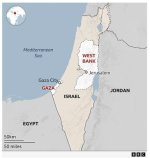

 en.wikipedia.org
Then there's a fourth criteria laid down in the Montevideo convention that is needed to recognise statehood: a functioning government. Back in 1994, an agreement between Israel and the Palestinian Liberation Organisation (PLO) led to the creation of the Palestinian National Authority (known simply as the Palestinian Authority or PA), which exercised partial civil control over Palestinians in Gaza and the West Bank.
en.wikipedia.org
Then there's a fourth criteria laid down in the Montevideo convention that is needed to recognise statehood: a functioning government. Back in 1994, an agreement between Israel and the Palestinian Liberation Organisation (PLO) led to the creation of the Palestinian National Authority (known simply as the Palestinian Authority or PA), which exercised partial civil control over Palestinians in Gaza and the West Bank.
But since a bloody conflict in 2007 between Hamas and the main PLO faction Fatah, Palestinians in Gaza and the West Bank have been ruled by two rival governments: Hamas in Gaza and the internationally recognised Palestinian Authority in the West Bank, whose president is Mahmoud Abbas, who’s into the twentieth year of his four year elected term at this point.
That's 77 years of geographical separation and 18 years of political division: a long time for the West Bank and Gaza Strip to drift apart.
Palestinian politics has ossified in the meantime, leaving most Palestinians cynical about their leadership and pessimistic about the chances of any kind of internal reconciliation, let alone progress towards statehood.
The last presidential and parliamentary elections were in 2006, which means that no Palestinian under the age of 36 has ever voted in the West Bank or Gaza.
"That we haven't had elections in all of this time just boggles the mind," says Palestinian lawyer Diana Buttu. "We need a new leadership." So an election then?
So an election then?
A recent opinion poll by the West Bank based Palestinian Centre for Policy and Survey Research found that 50% of Palestinians would choose Barghouti as president, well ahead of Abbas, who has held the position since 2005.

 en.wikipedia.org
Even before the Gaza war, Benjamin Netanyahu's opposition to Palestinian statehood was unambiguous. In February 2024, he said that, "Everyone knows that I am the one who for decades blocked the establishment of a Palestinian state that would endanger our existence."
en.wikipedia.org
Even before the Gaza war, Benjamin Netanyahu's opposition to Palestinian statehood was unambiguous. In February 2024, he said that, "Everyone knows that I am the one who for decades blocked the establishment of a Palestinian state that would endanger our existence."
Despite international calls for the Palestinian Authority to resume control over Gaza, Netanyahu insists that there will be no role for the PA in Gaza's future governance, arguing that Abbas has not condemned the Hamas attacks of 7 October, but boys will be boys, etc…
One thing is certain: if a Palestinian state does emerge, Hamas will not be running it. A declaration drawn up in July at the end of a three day conference sponsored by France and Saudi Arabia declared that "Hamas must end its rule in Gaza and hand over its weapons to the Palestinian authority."
The "New York declaration" was endorsed by all Arab states and subsequently adopted by 142 members of the UN General Assembly. For its part, Hamas says it's ready to hand over authority in Gaza to an independent administration of technocrats, but have they?

 apple.news
apple.news
The long-established “land for peace” legal framework for resolving the Israeli-Palestinian conflict, established by UN Security Council Resolution 242 and the Oslo Accords, provides that Palestinian statehood can only come as part of a negotiated solution to the conflict, in which Israel receives peace in return. Recognizing Palestine as a state under the current circumstances would torpedo that framework.

Four criteria for statehood are listed in the 1933 Montevideo Convention. Palestine can justifiably lay claim to two: a permanent population (although the war in Gaza has put this at enormous risk) and the capacity to enter into international relations - Dr Zomlot is proof of the latter.The international legal criteria for statehood require that a nascent state have a) a permanent population; b) a defined territory; c) a government with effective control over that population and territory; and d) capacity to enter into relations with other states.
But it doesn't yet fit the requirement of a "defined territory".
With no agreement on final borders (and no actual peace process), it's difficult to know with any certainty what is meant by Palestine.
For the Palestinians themselves, their longed-for state consists of three parts: East Jerusalem, the West Bank and the Gaza Strip. All were conquered by Israel during the 1967 Six Day War from…not Palestine.The European Council (EC) added several additional non-binding criteria in its 1991 guidelines for recognizing new states in Eastern Europe and the former Soviet Union. These include prospective states providing their citizens “the rule of law, democracy, and human rights.” Hmmm…

Six-Day War - Wikipedia


1948 Arab–Israeli War - Wikipedia
But since a bloody conflict in 2007 between Hamas and the main PLO faction Fatah, Palestinians in Gaza and the West Bank have been ruled by two rival governments: Hamas in Gaza and the internationally recognised Palestinian Authority in the West Bank, whose president is Mahmoud Abbas, who’s into the twentieth year of his four year elected term at this point.
That's 77 years of geographical separation and 18 years of political division: a long time for the West Bank and Gaza Strip to drift apart.
Palestinian politics has ossified in the meantime, leaving most Palestinians cynical about their leadership and pessimistic about the chances of any kind of internal reconciliation, let alone progress towards statehood.
The last presidential and parliamentary elections were in 2006, which means that no Palestinian under the age of 36 has ever voted in the West Bank or Gaza.
"That we haven't had elections in all of this time just boggles the mind," says Palestinian lawyer Diana Buttu. "We need a new leadership."
A recent opinion poll by the West Bank based Palestinian Centre for Policy and Survey Research found that 50% of Palestinians would choose Barghouti as president, well ahead of Abbas, who has held the position since 2005.

Marwan Barghouti - Wikipedia
Despite international calls for the Palestinian Authority to resume control over Gaza, Netanyahu insists that there will be no role for the PA in Gaza's future governance, arguing that Abbas has not condemned the Hamas attacks of 7 October, but boys will be boys, etc…
One thing is certain: if a Palestinian state does emerge, Hamas will not be running it. A declaration drawn up in July at the end of a three day conference sponsored by France and Saudi Arabia declared that "Hamas must end its rule in Gaza and hand over its weapons to the Palestinian authority."
The "New York declaration" was endorsed by all Arab states and subsequently adopted by 142 members of the UN General Assembly. For its part, Hamas says it's ready to hand over authority in Gaza to an independent administration of technocrats, but have they?
Recognising Palestinian statehood opens another question - who would lead it? — BBC News
With the president approaching 90 years of age and another possible candidate in jail, finding the right leadership would be a challenge
Well, the results of the vote (well, this one) are in. One of the permanent members of the security council (guess who?) has voted against, and nobody abstained from voting I believe.



(Some of those might even be alive)



(there seems to be a theme to this…)
(YouTube & U.S. DEFEATS U.N. text legitimising Hamas narrative)
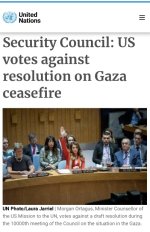
The US is one of five permanent Council members who possess the right to veto.
Speaking prior to the vote, representative Morgan Ortagus stated that Washington’s opposition to the resolution “will come as no surprise” as it fails to condemn Hamas or recognize Israel’s right to defend itself.
The text also “wrongly legitimizes the false narratives benefiting Hamas, which have sadly found currency in this Council,” she said.
“This resolution also refuses to acknowledge and seeks to return to a failed system that has allowed Hamas to enrich and strengthen itself at the expense of civilians in need.”
The five permanent members – China, France, Russia, the United Kingdom and the United States – have the right to veto any resolution and all have exercised this power at some time.
Permanent members were granted the right to veto because of their key roles in the establishment of the UN 80 years ago, with Russia taking over the seat held by the Union of Soviet Socialist Republics (USSR) in 1990.
The 10 non-permanent members are elected by the General Assembly, which comprises all 193 UN Member States, and serve for two-years periods.

 news.un.org
news.un.org
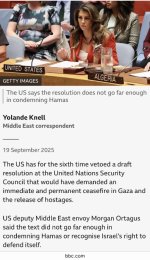
This latest UN vote came just days before world leaders gather for the UN General Assembly where Gaza will be a major topic and key American allies, including the UK, are expected to recognise an independent Palestinian state.
The Israeli military launched a campaign in Gaza in response to the Hamas-led attack on southern Israel on 7 October 2023, in which about 1,200 people were killed and 251 others were taken hostage. I wonder what the first step to ending this could be?

Oh yeah, well, here we are…

 www.bbc.com
www.bbc.com



(Some of those might even be alive)



(there seems to be a theme to this…)

The US is one of five permanent Council members who possess the right to veto.
Speaking prior to the vote, representative Morgan Ortagus stated that Washington’s opposition to the resolution “will come as no surprise” as it fails to condemn Hamas or recognize Israel’s right to defend itself.
The text also “wrongly legitimizes the false narratives benefiting Hamas, which have sadly found currency in this Council,” she said.
“This resolution also refuses to acknowledge and seeks to return to a failed system that has allowed Hamas to enrich and strengthen itself at the expense of civilians in need.”
The five permanent members – China, France, Russia, the United Kingdom and the United States – have the right to veto any resolution and all have exercised this power at some time.
Permanent members were granted the right to veto because of their key roles in the establishment of the UN 80 years ago, with Russia taking over the seat held by the Union of Soviet Socialist Republics (USSR) in 1990.
The 10 non-permanent members are elected by the General Assembly, which comprises all 193 UN Member States, and serve for two-years periods.

Security Council: US votes against resolution on Gaza ceasefire
The United States once again vetoed a UN resolution demanding an immediate, unconditional and permanent ceasefire in the Gaza Strip, following a vote in the Security Council on Thursday.

This latest UN vote came just days before world leaders gather for the UN General Assembly where Gaza will be a major topic and key American allies, including the UK, are expected to recognise an independent Palestinian state.
The Israeli military launched a campaign in Gaza in response to the Hamas-led attack on southern Israel on 7 October 2023, in which about 1,200 people were killed and 251 others were taken hostage. I wonder what the first step to ending this could be?

Oh yeah, well, here we are…

Israel-Gaza: US vetoes UN call for ceasefire for sixth time
Washington's representative says the Security Council resolution does not go far enough in condemning Hamas.
Did you forget about the genocide?Well, the results of the vote (well, this one) are in. One of the permanent members of the security council (guess who?) has voted against, and nobody abstained from voting I believe.
View attachment 31175
View attachment 31177
View attachment 31178
(Some of those might even be alive)
View attachment 31179
View attachment 31180
View attachment 31181
(there seems to be a theme to this…)
(YouTube & U.S. DEFEATS U.N. text legitimising Hamas narrative)
View attachment 31182
The US is one of five permanent Council members who possess the right to veto.
Speaking prior to the vote, representative Morgan Ortagus stated that Washington’s opposition to the resolution “will come as no surprise” as it fails to condemn Hamas or recognize Israel’s right to defend itself.
The text also “wrongly legitimizes the false narratives benefiting Hamas, which have sadly found currency in this Council,” she said.
“This resolution also refuses to acknowledge and seeks to return to a failed system that has allowed Hamas to enrich and strengthen itself at the expense of civilians in need.”
The five permanent members – China, France, Russia, the United Kingdom and the United States – have the right to veto any resolution and all have exercised this power at some time.
Permanent members were granted the right to veto because of their key roles in the establishment of the UN 80 years ago, with Russia taking over the seat held by the Union of Soviet Socialist Republics (USSR) in 1990.
The 10 non-permanent members are elected by the General Assembly, which comprises all 193 UN Member States, and serve for two-years periods.
View attachment 31183
Security Council: US votes against resolution on Gaza ceasefire
The United States once again vetoed a UN resolution demanding an immediate, unconditional and permanent ceasefire in the Gaza Strip, following a vote in the Security Council on Thursday.news.un.org
This latest UN vote came just days before world leaders gather for the UN General Assembly where Gaza will be a major topic and key American allies, including the UK, are expected to recognise an independent Palestinian state.
The Israeli military launched a campaign in Gaza in response to the Hamas-led attack on southern Israel on 7 October 2023, in which about 1,200 people were killed and 251 others were taken hostage. I wonder what the first step to ending this could be?
View attachment 31184
Oh yeah, well, here we are…

Israel-Gaza: US vetoes UN call for ceasefire for sixth time
Washington's representative says the Security Council resolution does not go far enough in condemning Hamas.www.bbc.com